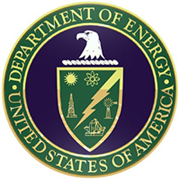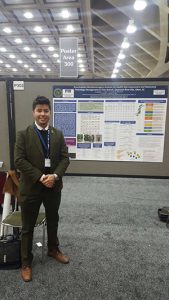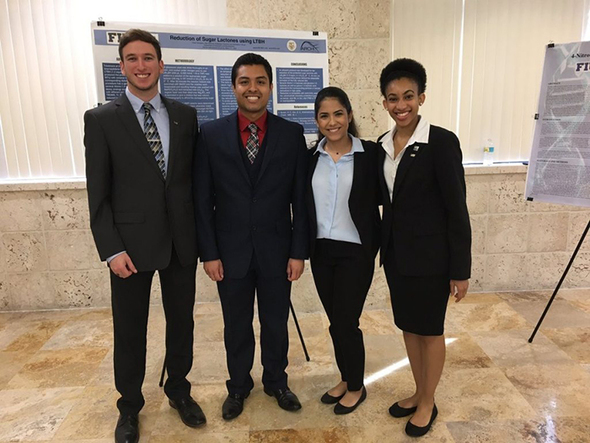Source: EM Newsletter, Vol. 10, Issue 8 | April 27, 2017
DOE Fellows have been busy sharing their research to support EM’s cleanup at conferences and other events across the U.S. this spring.
Their investigations focus on high-level waste and waste processing, soil and groundwater modeling and remediation, deactivation and decommissioning (D&D), and technology development.
The Fellows are from the DOE-Florida International University (FIU) Science and Technology Workforce Development Program, designed to create a “pipeline” of minority engineers trained and mentored to work at DOE.
They conducted their research at FIU’s Applied Research Center (ARC), and summer internships at EM headquarters and sites, and DOE national laboratories.
ARC supports EM’s cleanup through research in environmental remediation, radioactive waste processing and facility D&D. The program offers students 10-week summer internships at EM sites. The EM-ARC five-year cooperative agreement aims to develop the next generation of scientists and engineers, equipping them with skills and knowledge to contribute to the workforce after graduation.
Seven of the presentations dealt with soil and groundwater modeling and remediation:
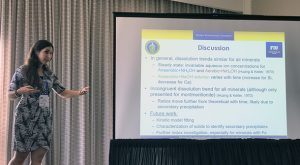
DOE Fellow Silvina Di Pietro presents at the American Chemical Society National Meeting & Exposition.
Silvina Di Pietro covered the effects of ammonia and variable redox conditions on mineral dissolution at the American Chemical Society National Meeting & Exposition in San Francisco. Di Pietro is studying the use of an innovative remediation technique that would inject ammonia gas into the subsurface at the Hanford Site to decrease the movement of uranium contamination. The results can help predict the long-term effectiveness of this technique.
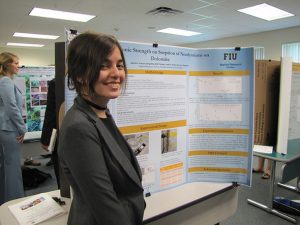
DOE Fellow Frances Zengotita speaks at the Life Sciences South Florida Undergraduate Research Symposium.
Frances Zengotita focused on the role of ionic strength on the sorption of neodymium on dolomite at the Life Sciences South Florida Undergraduate Research Symposium at Palm Beach State College in Florida. Zengotita’s research helps explain the long-term behavior of contaminants in the subsurface at EM’s Waste Isolation Pilot Plant. The research will be used to update the site’s long-term risk assessment models.
DOE Fellows Ripley Raubenolt presents a research poster at the FIU Undergraduate Research Conference.
Ripley Raubenolt presented the effect of sorbed humic acid on the mobility of uranium at the FIU Undergraduate Research Conference and the Life Sciences South Florida Undergraduate Research Symposium. Raubenolt’s research will help determine if a low-cost unrefined material containing humic acid, which is found in soil, can help the adsorption of uranium to control its movement in the groundwater at the Savannah River Site (SRS).
Awmna Rana discussed the effect of properties of acid-contaminated sediments on contaminant mobility at the FIU Undergraduate Research Conference.
Also at that conference, Alexis Smoot presented the synergetic interactions between uranium, humic acid, silica colloids and SRS sediments at variable pH levels at the conference. Smoot is investigating the effects of colloidal silica and humic acid on the removal of uranium from contaminated groundwater at SRS.
Juan Carlos Morales detailed an accumulated metalloestrogens analysis for health risk assessment and watershed toxicology management in Tims Branch at SRS at the Society of Toxicology Expo in Baltimore. Morales’ research will be used for modeling contaminant transport in the groundwater at SRS and an assessment of environmental health risks from human exposure.
Other presentations related to D&D and technology development:
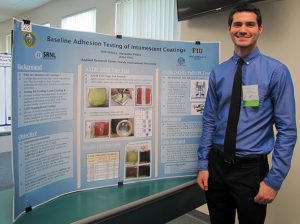
DOE Fellow Alexander Piedra presents at the Life Sciences South Florida Undergraduate Research Symposium.
Alexander Piedra discussed the baseline adhesion testing of intumescent coatings at the Life Sciences South Florida Undergraduate Research Symposium. Piedra is researching the effectiveness of commercially available intumescent coatings to enhance the fire resiliency of fixatives and facilities in support of D&D projects facing potential fire and extreme heat conditions.
Gene Yllanes presented on the T-Rex, a multipurpose all-terrain robotic platform, at the Life Sciences South Florida Undergraduate Research Symposium. Yllanes is investigating how to integrate robotic systems into hazardous work environments, which reduces risk to workers.
Three presentations related to summer internships:
A 2016 intern at EM headquarters in Washington, D.C., Smoot talked about her research on developing a sustainability index at the FIU Undergraduate Research Presentation event for FIU’s Foundation Board of Directors. She also presented at the National Conference on Undergraduate Research in Memphis, Tennessee. The index attempts to quantify the relative sustainability of active and passive remediation strategies.
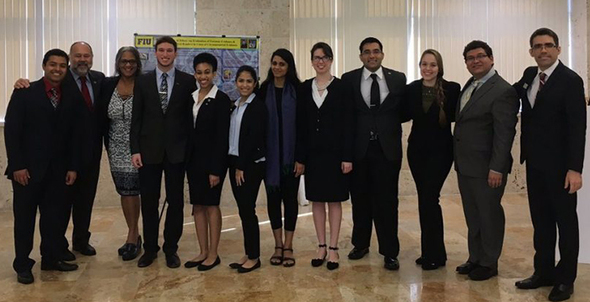
Honors College Associate Dean Espinosa, second from left, with FIU students at a research presentation event.
Di Pietro spoke at FIU’s Panther Alumni Week about her FIU undergraduate and Honors College experiences and advised students on leadership. She stressed the importance of participating in internships before graduating and shared her experience as an intern at the Pacific Northwest National Laboratory last summer as part of the DOE Fellows Program at FIU.
Nearly 20 Fellows presented technical posters or spoke about their research at the 2017 Waste Management Symposium in early March.
